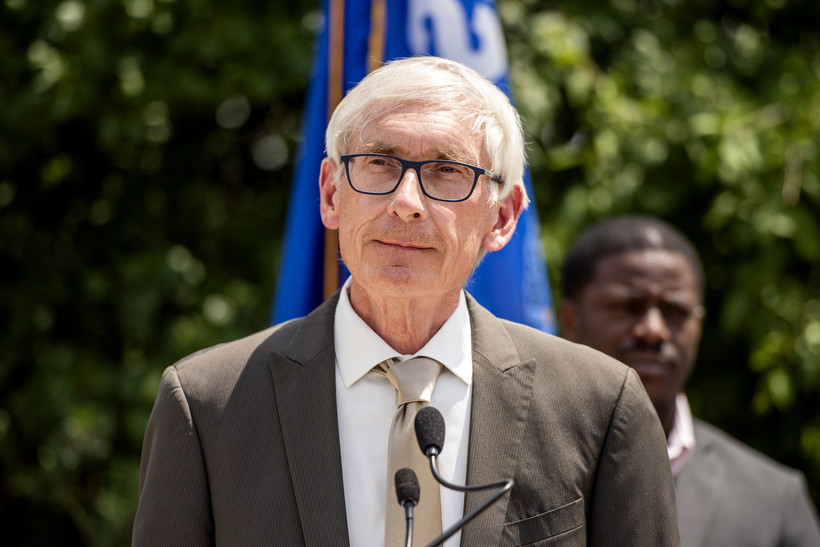Wisconsin Joins Multi-State Pact In Bid for Hydrogen Funding
Wisconsin joins MN, ND and MT in creating "hub" that hopes to land part of $8 billion in federal clean energy funding.

Gov. Tony Evers speaks during a press conference Tuesday, July 6, 2021, in Waukesha, Wis. Angela Major/WPR
Clean energy advocates hope a recent move by Gov. Tony Evers to join in a regional consortium will help Wisconsin win federal funding to expand hydrogen power in the state.
Evers signed a non-binding Memorandum of Understanding. It’s an informal collaboration between Wisconsin, Minnesota, Montana and North Dakota, marking the first phase of a long-term project to secure federal funding from the U.S. Department of Energy, or DOE, that would create a network of clean energy infrastructure projects and partners.
Experts say “green hydrogen” is attracting attention because it can be generated carbon-free through electrolysis. The process separates water into hydrogen and oxygen. It’s a potential alternative to fossil fuel power generation that could transform the transportation, aviation and manufacturing industries.
While most hydrogen is currently produced through burning fossil fuels, state leaders say the process could be powered through renewables like solar and wind. Still, they have not yet determined what the hub will look like.
“It’s an opportunity for regions, states, local governments, businesses, industry to come together to demonstrate production, processing, delivery, storage, and end-use of clean hydrogen,” said Marie Redmond, director of the Office of Sustainability and Clean Energy.
Others like Chelsea Chandler, climate energy and air program director for CLEAN Wisconsin, are hopeful it’s an opportunity to make strides in hydrogen production.
She said that while other states like California and Hawaii “are further along on hydrogen,” the step taken by Evers was one of several goals outlined in the state’s first Clean Energy Plan, which passed last year.
Discussions on hydrogen hubs began at the end of last year, when Congress passed the bipartisan infrastructure law, awarding the DOE $8 billion, according to Redmond.
States are competing for federal funding that would create four regional hubs nationwide.
“That’s the gamble, right, is that there’s only so much money to go around. And so we want to really, really justify the need for having a hydrogen hub here,” she said, adding that while individual states could apply, Wisconsin “saw power in numbers.”
The announcement came after the creation of the Midwestern Hydrogen Coalition, a collaboration with Evers and six other governors.
Hydrogen is more expensive than fossil fuels, but Redmond said the state is still dedicated to using hydrogen energy and investing in renewables regardless of funding.
“Even if we aren’t awarded money for a hydrogen hub, we’re still going to move forward with figuring out how to build out hydrogen here in the Midwest,” she said.
Is hydrogen the new natural gas?
Elsewhere, groups are looking at hydrogen as they explore clean energy solutions. WEC Energy Group, which is publicly regulated by the state, is rolling out a pilot project in Michigan that would turn gas into hydrogen.
“The idea is, could hydrogen replace natural gas in the future, and if so, how do we do that?” said WEC Energy Group spokesman Brendan Conway.
Chandler of CLEAN Wisconsin said hydrogen fills an important void in areas where other renewables can’t.
“The best path for decarbonizing our economy is going to be by electrifying our economy,” she said. “But there are some sectors that are just not well-suited to electrification and where something like hydrogen has an advantage, and can help kind of decarbonize those remaining challenging niche areas.”
Chandler said the challenge to making it a reliable source of fuel is isolating hydrogen gas.
“Hydrogen is super abundant in earth, but pure hydrogen gas, H2, is not,” she said.
If the hub becomes a reality, it would create more clean energy jobs, including engineers, developers, consultants, electrical workers, among others, according to Redmond. She said the state will need to invest in training and educating employees.
The federal Office of Energy Efficiency & Renewable Energy will match energy stakeholders with hubs to create more jobs and “support private sector development of hydrogen production.”
“We have to make a really concerted effort in production, processing, delivery, storage and use of clean fuels,” Redmond said. “And so this is a way for us to collectively work together on planning construction and operation of a commercial-scale hydrogen hub that addresses all of those dimensions of hydrogen.”
An uncertain but exciting future
Clean energy advocates agree there’s no clear roadmap yet for the future of hydrogen in Wisconsin. Most projects are in their early stages of research and development.
“There’s still a lot of things to be determined. But I think it’s incredibly exciting that we’re having these discussions and able to do pilot projects like ours, testing it now to see what the future is going to be,” Conway of WEC said.
Since 2013, about 10 percent of Wisconsin’s energy has been generated through renewables. It’s not yet clear how much hydrogen will be produced when the states join forces with the hub.
As with any energy source, there are tradeoffs.
CLEAN Wisconsin’s Chandler said truly clean hydrogen must come from electrolysis, or renewable sources like wind and solar, which represent “a tiny fraction of how it’s made today.”
“It’s also a little hard to transport,” she said. “Hydrogen gas is often stored as a compressed gas or a liquid hydrogen, you have to be careful about leakage and combustion.”
Chandler said she thinks of hydrogen as just one tool at the state’s disposal.
Redmond said there’s great potential for “end-use diversity,” or different ways to use hydrogen — through electric power generation, industrial energy, residential, commercial heating or in the transportation sector.
The federal Inflation Reduction Act passed this year also creates tax credits that will make clean hydrogen generation more competitive with other methods of production, according to the release.
Wisconsin and its neighboring partners will next submit a “concept paper” to the DOE in early November.
“After that point, there’ll be some more definition around each of the hydrogen hubs, what each state will be pursuing and how it looks to start,” Redmond said.
The DOE will fund six to 10 more planning efforts, but only two to three will be fully funded. Until then, it’s a race — and it just began.
Listen to the WPR report here.
Gov. Evers joins pact of states to move forward with regional hydrogen hub was originally published by Wisconsin Public Radio.





















